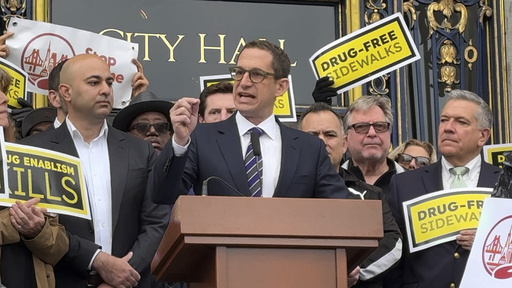San Francisco’s Board of Supervisors made a significant decision on Tuesday, granting newly elected Mayor Daniel Lurie enhanced authority and flexibility aimed at tackling the city’s ongoing fentanyl crisis, which has resulted in visible drug use and homelessness on city streets.
In a decisive vote of 10-1, the Board removed competitive bidding mandates for certain contracts, enabling the administration to seek private donations aimed at quickly adding 1,500 shelter beds, along with hiring more specialists in public safety and behavioral health.
Lurie, an heir to the Levi Strauss fortune and founder of an anti-poverty nonprofit organization, expressed his satisfaction with the legislative outcome. Having never previously held an elected position, Lurie triumphed over Mayor London Breed in last year’s election, where he emphasized the need for collaborative efforts to address critical issues in the city.
“I am pleased to fulfill my commitment today as mayor,” Lurie stated. “The Fentanyl State of Emergency Ordinance equips us with the necessary tools to confront this crisis with the urgency it demands. Alongside our partners on the board, we will take decisive action.”
The Board’s decision to cede oversight for this initiative reflects their desperation for a solution, despite the absence of a detailed plan or accountability measures. This move also illustrates their endorsement, at least temporarily, of an outsider who has promised to work together toward practical solutions.
“I want to emphasize that this ordinance represents an unprecedented transfer of power,” noted Supervisor Jackie Fielder, who holds a more progressive stance than the mayor. She expressed her trust in the mayor’s administration to “deliver housing, shelter, and treatments to those in need.”
However, Supervisor Shamann Walton, who aligns with the city’s progressive political spectrum, was the only dissenting vote due to concerns about the lack of specifics.
“This is perhaps the most evident case I’ve witnessed of putting the cart before the horse during my time in office,” Walton remarked, stressing that checks and balances are crucial to prevent dictatorial practices within San Francisco’s governance.
Supervisor Connie Chan chaired the budget and finance committee that advanced the legislation, stating it was essential for the Board to maintain oversight, ensuring responsible management of taxpayer funds.
Nonetheless, Chan acknowledged the extraordinary circumstances necessitating unusual actions and expressed her appreciation for the mayor’s willingness to negotiate. Lurie’s predecessor, London Breed, had often encountered tension with the Board’s more progressive members, including Chan.
San Francisco has long been characterized by its liberal policies, often favoring social services over law enforcement intervention. However, during the COVID-19 pandemic, the number of homeless encampments and instances of public drug use increased dramatically. Additionally, the number of overdose deaths, largely attributed to inexpensive and potent fentanyl, reached a staggering high of over 800 in the city during 2023.
In light of these issues, many residents expressed frustration, pushing for enhanced police powers and endorsing tougher actions against street homelessness, which resulted in the election of more moderate Democrats to the Board.
The proposal presented by Lurie will permit the city to bypass the standard competitive bidding process for contracts, grants, and leases related to addiction treatment, homelessness services, and public safety. City departments will also have the authority to initiate new leases without Board approval. The mayor intends to establish a round-the-clock drop-off center that would be less daunting for individuals than the prospect of jail time.
Under the new rules, supervisors will have a reduced timeframe of 45 days to vote on contracts up to $25 million—down from the originally suggested $50 million—or forfeit their oversight rights. Meanwhile, the expedited contracting process will last only one year, rather than five.
The San Francisco AIDS Foundation has voiced opposition to this new proposal, highlighting its lack of attainable metrics or specific strategies to effectively curb fentanyl usage, according to Laura Thomas, the nonprofit’s expert in drug policy and senior director focused on HIV and harm reduction.
While appreciating the mayor’s commitment to expanding housing and treatment options, Thomas hopes he will avoid endorsing policies that force individuals into treatment, which have historically been shown to have detrimental and ineffective outcomes.
During a budget and finance committee meeting on Wednesday, legislative analyst Nicolas Menard warned that abandoning competitive bidding could lead to inflated service costs and “create opportunities for waste, fraud, and abuse.” The full fiscal implications are currently unclear, but the combined budget for the affected city departments involving grants and contracts exceeds $1 billion.
“I want to be very clear that you’re relinquishing a lot here,” he cautioned. The legislation is set to undergo a second vote next week—likely a formality—before being sent to Mayor Lurie for his approval.


